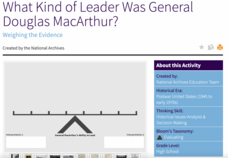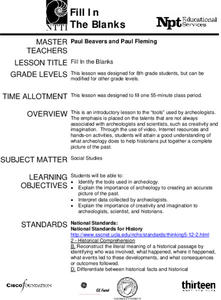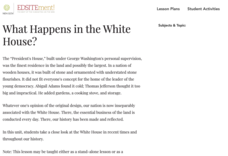Stanford University
What Is History?
Five important tenets of any social studies class are available for young historians with a poster that defines history as an account of the past. It encourages learners to question reliability of an author's perspective, as well as to...
Curated OER
Arkansas' Top Ten Events of the Century....Says Who? Why? Deciding What is Important in History
Middle and high schoolers work in small groups to compare four different lists published in the Arkansas Times newspaper which chose the "top ten" Arkansas news events of the 20th century. Learners look for similarities and differences...
PBS
What's In a Name?
What is in a name? Eager historians trace the geographical history of places in the United States with Spanish names. Using a worksheet activity, clues, and web research developed in conjunction with the PBS "Latinos in America" series,...
Curated OER
What is Meant by Returning to Fundamental Principles?
What did the Founding Fathers mean by the importance of continually returning to fundamental principles? Your young historians will analyze a series of quotations illustrating the fundamental ideals and principles of the United States...
PBS
Think Like a Historian: A Viewing Guide
Calling all junior detectives! Scholars use the tools of investigation to determine the causes and impacts of the American Civil War. Using viewing guides, videos, group research, and written resources, they discover what it takes to...
Atlanta History Center
What if YOU Lived During Jim Crow?
Young historians envision what life was like for African Americans living in the Jim Crow South through hands-on, experiential activities.
John F. Kennedy Presidential Library & Museum
Ask Not What Your Country Can Do for You
Ask not what the activity here can do for you, but what you can do with the activity. The answer is quite a lot! Young scholars revisit JFK's famous inaugural address with a focus on his plea for civic engagement. There's a letter to JFK...
DocsTeach
What Kind of Leader Was General Douglas MacArthur?
For five decades, General Douglas MacArthur shaped US military involvement around the world. His career ended when he went toe to toe with President Dwight Eisenhower over the Korean War. Young historians evaluate the complicated command...
DocsTeach
To What Extent was Reconstruction a Revolution? (Part 2)
While Reconstruction laid the groundwork, many believe its revolutionary ideals weren't realized until the 1960s Civil Rights Movement. Using the 1965 Voting Rights Act, budding historians consider why it took more than 100 years to...
Curated OER
Creating Historians Part Two: The Grab Bag
You don't need to be a museum curator to bring artifacts into the classroom; part two of a series on approaching social studies as a group of historians.
Curated OER
Creating Historians: Send Them Out
Get teenagers out of the classroom in the pursuit of history; part three of a series on approaching social studies as a group of historians.
Center for Civic Education
What Basic Ideas About Government Are Included in the Preamble to the Constitution?
Young historians explore the meaning of the Preamble to the US Constitution in this upper-elementary social studies lesson. Working with partners or in small groups, children discuss the purpose of government before reading and analyzing...
Center for History Education
Daily Lives of Slaves - What Really Happened?
The stories of enslaved people are preserved forever thanks to the Great Depression. Budding historians explore slave narratives gathered by a federal government initiative to discover what life was actually like for enslaved people....
Plimoth Plantation
Thanksgiving Interactive: You are the Historian
Take on the roles of two very different individuals living together during the same time: a pilgrim and a member from the Wampanoag Tribe. As learners navigate through the interactive, each click takes them to a part of each village to...
The New York Times
Reader Idea | Thinking Like a Historian About Current World Events
Check out this fantastic research project where learners work to see the modern world through the eyes of a historian and analyze a contemporary event of their choice. An in-depth reflection on the project is given by the project...
Curated OER
Fill in the Blanks
Archaeologists, historians, and scientists all work together to create a timeline of our past. Engages learners in a series of activities that all filter through the NOVA video, "Mysteries of the First Americans." Each activity is...
Norwich University
Seven Man-Made Engineering Wonders of the Ancient World
Imagine precisely cutting and then moving a 120 ton boulder more than two miles without mechanical cutting tolls, skid loaders, or hydraulic cranes. Imagine carving a stone figure that includes a drainage system that permits rainwater to...
Stanford University
Sourcing
What questions do historians ask when sourcing a document? Here's a poster that models these questions.
Curated OER
What Portraits Reveal
Students examine how portraits can tell us more about people of the past than just what they looked like. They compare three portraits of U.S. Presidents, analyze portraits of Americans from the Revolutionary War, and write a report on...
Curated OER
What Kind of Vessel Are You?
This is a strange question; but what kind of vessel would you be and why? After examining images of a large Inca jug, the class sets to writing a creative narrative that answers that very interesting question. They start by researching...
National Endowment for the Humanities
What Happens in the White House?
Young historians complete a unit of lessons on the functions of the White House. They conduct Internet research, develop a list of activities that take place at the White House, and create a chronological timeline of events at the White...
Center for Civic Education
What Basic Ideas Are in the Preamble to the Constitution?
Introduce young historians to the US Constitution with this upper-elementary social studies lesson plan. Beginning with a general discussion about the role of government in society, students go on to work in small groups identifying and...
Crafting Freedom
F.E.W. Harper: Uplifted from the Shadows
What is stereotyping, and how do we handle stereotyping in our daily interactions? Your young historians will not only have the opportunity to learn about the first African American woman to publish a short story–Frances Ellen...
National Museum of the American Indian
Lone Dog's Winter Count: Keeping History Alive
What is oral tradition, and what unique tool did the Native Americans of the Northern Great Plains use to help them remember their complex histories? Through pictograph analysis, discussion, research, and an engaging hands-on activity,...

























